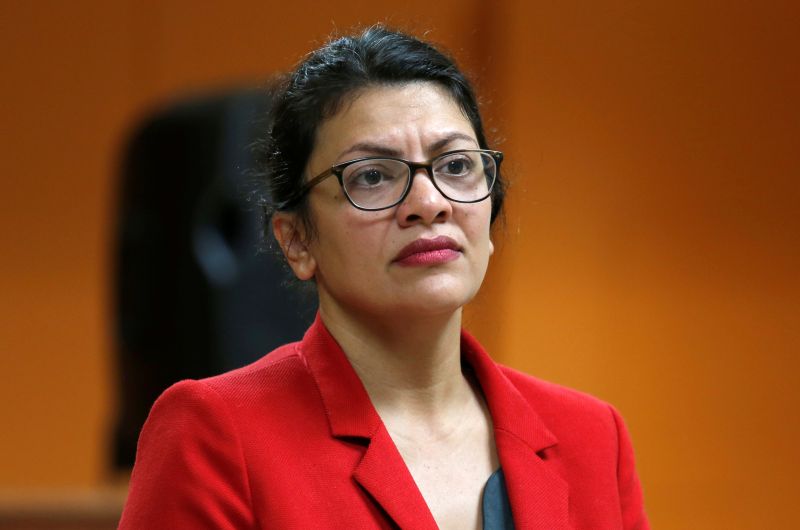U.S. Rep. Tlaib refuses Israel's 'oppressive conditions' for West Bank visit

U.S. Congresswoman Rashida Tlaib listens to a comment from a constituent during a Town Hall style meeting in Inkster, Michigan, US on August 15, 2019. (REUTERS Photo)
WASHINGTON/JERUSALEM, August 16 (Reuters): U.S. congresswoman Rashida Tlaib on Friday rejected an offer by Israel to let her travel to the West Bank, saying she would not visit her family there because the Israeli government had imposed "oppressive conditions" to humiliate her.
Tlaib, a Democrat in the U.S. House of Representatives who has been critical of Israeli policy towards the Palestinians, had planned to make an official visit to Israel along with fellow Democrat congresswoman Ilhan Omar from Minnesota.
Israeli Prime Minister Benjamin Netanyahu, under pressure from Republican U.S. President Donald Trump, on Thursday said he would not allow the pair to make a planned trip to Israel. On Friday, Israel decided to allow Tlaib to visit family in the Israel-occupied West Bank on humanitarian grounds.
But the Michigan congresswoman rejected the offer.
"I can't allow the State of Israel to take away that light by humiliating me & use my love for my sity to bow down to their oppressive & racist policies," Tlaib tweeted, using the word sity to refer to her grandmother.
"Silencing me & treating me like a criminal is not what she wants for me. It would kill a piece of me. I have decided that visiting my grandmother under these oppressive conditions stands against everything I believe in--fighting against racism, oppression & injustice," she added.
Israel's Interior Ministry said it had received a letter from Tlaib on Thursday seeking permission to visit her family, and granted her request.
Tlaib, in her tweets, did not outline what the conditions imposed on her visit were. Israeli media, however, reported that she had agreed not to promote boycotts against Israel as part of her request to Israel's Foreign Ministry.
Tlaib and Omar have voiced support for the pro-Palestinian Boycott, Divestment, Sanctions (BDS) movement which opposes the Israeli occupation and policies toward Palestinians in the West Bank and Gaza. Under Israeli law, BDS backers can be denied entry to Israel.
Israeli Interior Minister Aryeh Deri, who had approved Tlaib’s visit request, blasted her decision not to come.
"It turns out that it was a provocation to embarrass Israel. Her hatred for Israel overcomes her love for her grandmother," he wrote on Twitter.
BAN OUTCRY
The initial ban sparked an outcry among Democrats in the U.S. Congress, who have largely been strong supporters of Israel. Both U.S. House Speaker Nancy Pelosi and U.S. Senate Democratic Leader Chuck Schumer called on Israel to reverse the ban. Palestinians also decried the ban.
The American Israel Public Affairs Committee, a powerful lobbying group, had also said while it did not support the two congresswomen's views, that they should be allowed to visit.
Tlaib and Omar are the first two Muslim women to be elected to Congress, and the Detroit-born Tlaib is also the first Palestinian-American congresswoman. Both are members of their party's progressive wing and sharp critics of Trump and Israeli policy.
Their official visit was to have included visits to the occupied West Bank and East Jerusalem, territories Israel captured in the 1967 Middle East war and which Palestinians envisage as part of an independent state along with Gaza.
Trump for weeks has attacked Tlaib and Omar, along with fellow Democratic U.S. Representatives Alexandria Ocasio-Cortez of New York and Ayanna Pressley of Massachusetts.
He has accused the women -- four first-term lawmakers and women of color known as "the Squad" -- of hostility to Israel in a barrage condemned by critics as racist and widely seen as a way to drum up votes for his 2020 re-election campaign.
Tlaib, 43, has roots in the West Bank village of Beit Ur Al-Fauqa, where her grandmother and extended family live.
The prospects of ending the occupation and resolving the Israeli-Palestinian conflict under the so-called two-state solution which had guided international peace-making efforts since 1993 have all but evaporated, while Israeli settlements in the territories have expanded.
The Trump administration, which is particularly close to the Netanyahu government, has touted its own peace plan but details remain vague. It fuelled Palestinian anger by recognizing disputed Jerusalem as Israel's capital in 2017.






